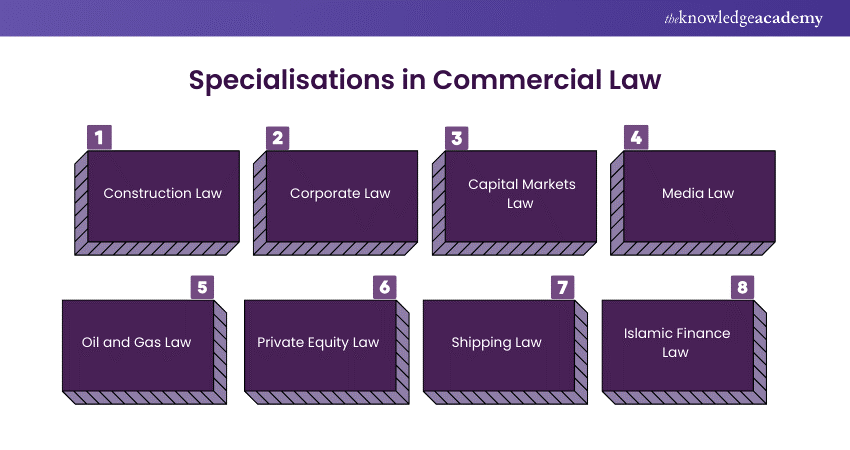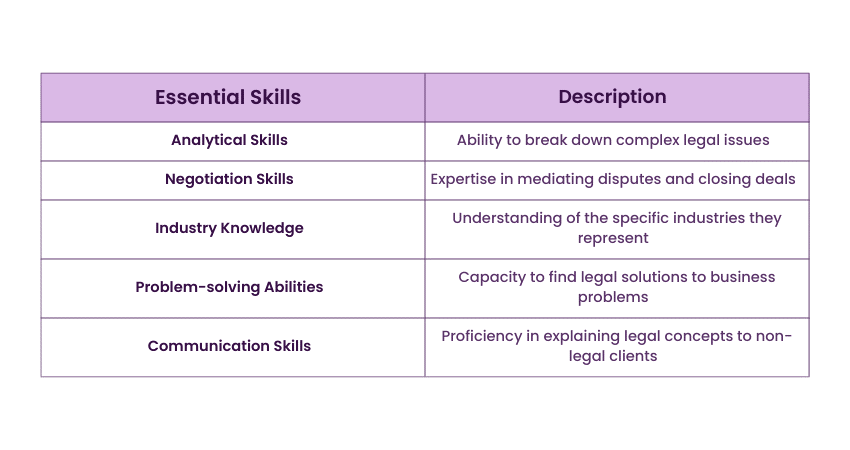We may not have the course you’re looking for. If you enquire or give us a call on +44 1344 203 999 and speak to our training experts, we may still be able to help with your training requirements.
Training Outcomes Within Your Budget!
We ensure quality, budget-alignment, and timely delivery by our expert instructors.

Navigating the business world requires a solid foundation of laws that protect, regulate, and guide every transaction. Enter Commercial Law, the legal framework shaping the world of commerce. But What is Commercial Law exactly? This blog unravels its complexities, exploring specialisations, career prospects, and the critical role lawyers play in safeguarding Commercial Interests.
Table of Contents
1) What is Commercial Law?
2) The Importance of Studying Commercial Law
3) The Role of Commercial Lawyers
4) Areas of Practice within Commercial Law
5) Specialisations in Commercial Law
6) Essential Skills for Commercial Lawyers
7) Career Opportunities in Commercial Law
8) Average Salary for Commercial Lawyers
9) Conclusion
What is Commercial Law?
Commercial Law, also called business law, regulates the rights, relationships, and behaviour of individuals, businesses, and organisations engaged in commerce, trade, and sales. This branch of Law governs interactions between corporations and individuals and enforces adherence to both national and international laws.
Commercial Law involves a range of legal practices that assist in the smooth functioning of businesses. It includes topics ranging from contracts and property law to intellectual property rights and company mergers.
The Importance of Studying Commercial Law
Commercial law is a robust and growing sector that thrives alongside our economy. Pursuing a study in Commercial Law not only enhances research skills, attention to detail, and client interaction but also equips you with the ability to stay current with industry news and economic changes.
This field offers diverse opportunities, as it encompasses various aspects of trade. For example, Commercial Lawyers can offer tax advice and provide sound counsel on contract law. Consequently, there is a consistent demand for legal professionals specializing in Commercial Law.
The Role of Commercial Lawyers
Commercial Lawyers provide specialised advice to businesses regarding their legal rights and duties. Their main responsibilities include:
a) Creating contracts
b) Discussing agreements
c) Settling conflicts, and
d) Ensuring compliance with all legal regulations by companies.
These attorneys assist companies in different sectors in avoiding legal dangers and handling potential risks.
Commercial Lawyers play a pivotal role in crucial business decisions such as mergers and acquisitions and restructuring. They provide invaluable advice to companies, ensuring their interests are protected.
Protect your business and employees with our comprehensive Employment Law Training – enhance your expertise now!
Areas of Practice within Commercial Law
Commercial Law is vast and diverse, covering many industries and sectors. Here are some of the common areas' Commercial Lawyers practice in:
a) Contract Law: Focusing on agreements between businesses.
b) Employment Law: Ensuring legal compliance in workplace environments.
c) Intellectual Property Law: Protecting the rights of creators and inventors.
d) Trade Law: Governing the exchange of goods and services between entities.
e) Tax Law: Advising businesses on compliance with tax regulations.
Specialisations in Commercial Law
Numerous specialisations within Commercial Law allow lawyers to focus on specific industries or legal aspects. Below are key specialisations that drive business and economic growth:

Each specialisation requires deep knowledge of industry-specific regulations, making Commercial Lawyers indispensable in these fields.
1) Construction Law
Construction Law pertains to issues concerning construction and infrastructure endeavours. Attorneys in this sector manage disagreements concerning construction agreements, allegations of negligence, and payment disputes. They make sure projects comply with legal standards and regulations and assist in resolving conflicts among contractors, property developers, and investors.
2) Corporate Law
Corporate Law regulates how corporations are formed and run. It includes activities ranging from establishing new businesses to merging, acquiring, and managing corporate entities. Lawyers in this field make sure that companies follow laws and rules, safeguard shareholders' rights, and navigate the intricate legal landscape of corporate finance.
3) Capital Markets Law
Capital Markets Law focuses on the rules and regulations governing securities buying, selling, and issuance. Lawyers in this field advise businesses on initial public offerings (IPOs), mergers, and stock and bond management. Their work is crucial in maintaining market integrity and investor trust.
4) Media Law
Media Law protects the legal rights of those involved in broadcasting, publishing, and creating digital content. It ensures that intellectual property laws are upheld and manages legal challenges related to defamation, censorship, and media regulation.
5) Oil and Gas Law
Oil and Gas Law deals with the legal framework surrounding natural resource exploration, extraction, and distribution. Lawyers in this sector address environmental regulations, property rights, and contracts between governments and corporations.
6) Private Equity Law
Private Equity Law involves managing investments in private companies. Lawyers here work on acquisitions, buyouts, and restructuring deals. They advise investors and companies on the legalities of equity financing, ensuring that transactions comply with legal standards and protecting stakeholders' interests.
7) Shipping Law
Shipping Law governs the international transportation of goods. Lawyers in this field handle shipping disputes, cargo claims, and the interpretation of international trade laws. They ensure that all parties involved in transporting goods comply with maritime laws.
8) Islamic Finance Law
Islamic Finance Law is a growing specialisation that adheres to the principles of Sharia law in financial transactions. Lawyers in this field ensure that financial products and services, such as banking, investments, and insurance, comply with Islamic Law, which prohibits certain types of interest and unethical investments.
Stay compliant and excel with UAE Labour Law Training – empower your knowledge today!
Essential Skills for Commercial Lawyers
To thrive in Commercial Law, a lawyer needs a mix of technical and soft skills. These include:

These skills help Commercial Lawyers navigate legal complexities while serving the best interests of their clients.
Career Opportunities in Commercial Law
Commercial Law offers diverse career paths, from working in large law firms to serving as corporate in-house counsel. Lawyers can specialise in various sectors, such as real estate, intellectual property, banking, etc. Opportunities are also plentiful in government roles, non-profit organisations, and international business law firms.
Commercial Law also opens doors to academia, legal research, and consultancy roles, making it one of the most versatile legal career options.
Average Salary for Commercial Lawyers
Salaries for Commercial Lawyers can vary significantly depending on location, industry, and experience level. Specialisations such as Corporate Law or Oil and Gas Law may offer premium compensation. Here is the breakdown of the average salary for Commercial Lawyers in the UK based on their experience level:

Source: Glassdoor
Conclusion
The world of commerce thrives on the foundational principles of Commercial Law. But What is Commercial Law beyond its textbook definition? It’s the unseen structure behind every business transaction, safeguarding the interests of corporations and consumers alike. Commercial Lawyers are the architects of this structure, ensuring that the business world operates smoothly.
Safeguard your business integrity with our Anti-Bribery Training Course – start protecting today!
Frequently Asked Questions

To become a Commercial Lawyer, you need a law degree and additional training, such as the UK Legal Practice Course (LPC). Gaining practical experience through internships or trainee programmes is also essential.

Corporate Law precisely focuses on company formation, governance, and management, while Commercial Law covers a broader range of business activities, including contracts, transactions, and trade-related issues.

The Knowledge Academy takes global learning to new heights, offering over 30,000 online courses across 490+ locations in 220 countries. This expansive reach ensures accessibility and convenience for learners worldwide.
Alongside our diverse Online Course Catalogue, encompassing 19 major categories, we go the extra mile by providing a plethora of free educational Online Resources like News updates, Blogs, videos, webinars, and interview questions. Tailoring learning experiences further, professionals can maximise value with customisable Course Bundles of TKA.

The Knowledge Academy’s Knowledge Pass, a prepaid voucher, adds another layer of flexibility, allowing course bookings over a 12-month period. Join us on a journey where education knows no bounds.

The Knowledge Academy offers various Employment Law Courses, including Commercial Law Training, Employment Law Training and UAE Labour Law Training. These courses cater to different skill levels, providing comprehensive insights into What is Employee Engagement.
Our Human Resources Blogs cover a range of topics related to Employment Laws, offering valuable resources, best practices, and industry insights. Whether you are a beginner or looking to advance your knowledge of Employment Laws, The Knowledge Academy's diverse courses and informative blogs have got you covered.
Upcoming HR Resources – Learn about Human Resources Batches & Dates
Date
 Commercial Law Training Course
Commercial Law Training Course
Fri 6th Dec 2024
Fri 10th Jan 2025
Fri 14th Mar 2025
Fri 9th May 2025
Fri 11th Jul 2025
Fri 12th Sep 2025
Fri 14th Nov 2025







 Top Rated Course
Top Rated Course



 If you wish to make any changes to your course, please
If you wish to make any changes to your course, please


